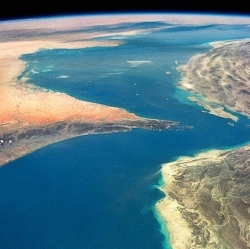
There’s a "real good chance" the vehicle won’t make it to orbit during the liftoff, Musk said Wednesday (July 19) at the 2017 International Space Station Research and Development (ISSR&D) conference in Washington, D.C. That launch is expected to take place later this year from Florida’s Space Coast.
"I hope it makes it far enough away from the pad that it does not cause pad damage. I would consider even that a win, to be honest," Musk told NASA ISS program manager Kirk Shireman, who interviewed the SpaceX CEO onstage at the meeting. "Major pucker factor, really; that’s, like, the only way to describe it."
The two-stage Falcon Heavy is based on SpaceX’s Falcon 9 rocket, which has been ferrying payloads to space since 2010. The Heavy’s first stage consists of two Falcon 9 first stages strapped to a central "core," which is itself a modified Falcon 9 booster.
Like the Falcon 9, the Heavy is designed to be reusable.
When the 230-foot-tall (70 meters) Falcon Heavy is up and running, it will be capable of lofting up to 60 tons (54 metric tons) to low-Earth orbit and 24 tons (22 metric tons) to geostationary transfer orbit, making it the most powerful rocket since NASA’s famous Apollo-era Saturn V launcher, SpaceX representatives have said.
SpaceX has been developing the Falcon Heavy for years. The work has proven to be "way, way more difficult" than SpaceX originally expected, Musk said.
"At first, it sounds really easy: Just stick two first stages on as strap-on boosters. How hard can that be?" he said. "But then everything changes. All the loads change, aerodynamics totally change, you’ve tripled the vibration and acoustics."
The loads imparted on the center core during Falcon Heavy launches will be "crazy," Musk said, "so we had to redesign the whole center-core airframe. It’s not like the Falcon 9, because it’s got to take so much load."
In addition, it’s impossible to fully test many aspects of the vehicle on the ground, he said.
So, while Musk stressed that he thinks the Falcon Heavy will prove to be "a great vehicle," the initial liftoff could be rocky.
"I encourage people to come down to the cape to see the first Falcon Heavy mission," he said, referring to Florida’s Cape Canaveral. "It’s guaranteed to be exciting."
SpaceX has not yet announced an official date for the launch. Musk recently suggested on Twitter, however, that the liftoff may happen in September or October.
